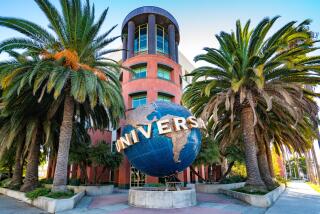London Stock Market Still Has Swedish Suitor
- Share via
DAVOS, Switzerland — Like a suitor who refuses to take no for an answer, Sweden’s Per Larsson is biding his time, waiting for the right moment to once again woo the grande dame of Europe’s stock markets.
Larsson’s company, OM Gruppen, failed in its earlier effort to buy out the London Stock Exchange, but he says the chemistry for a perfect fit is stronger than ever.
“The LSE doesn’t need another exchange--it needs a technology partner,” he told the Associated Press.
But the OM president stressed that collaboration, not conquest, is his aim. “If we were to make another bid for the LSE . . . it would have to be on a friendly basis.”
OM, which made its name designing share-trading technologies, startled Europe’s national stock markets in September when it made an unsolicited $1.6-billion offer for the London exchange, the region’s largest in terms of trading volume.
The Swedish company, owner of the much smaller Stockholm Stock Exchange, failed to win enough support from the LSE’s shareholders, but it did prompt the London exchange to scotch a planned powerhouse merger with Germany’s Deutsche Boerse.
The logic of an OM-LSE merger has improved since then, Larsson said. Speaking recently on the sidelines of the latest World Economic Forum in Davos, Switzerland, he said a marriage of OM’s technological savvy with the LSE’s deep market and coveted brand value would create a European champion in an increasingly competitive industry.
Others aren’t so sure. Some analysts say OM is out of its league and would bring little to any deal with the LSE.
“At this stage, OM seems to be a bit of a long shot,” said Chris Hipkins, head of cash equity trading at bank BNP Paribas in London.
Stock Exchanges Must Adapt
Larsson envisions a not-too-distant future in which investors will rely on electronic communication networks to buy and sell shares. He believes that national stock exchanges, with their traditional trading floors, will stagger toward extinction unless they can adapt.
“Our argument is if you don’t embrace technology, it will become your biggest enemy. That’s what’s happening with the LSE,” he said.
Larsson argues that the London exchange’s computer trading system is inferior to what OM and other bourses can offer. He also criticized what he called the LSE’s lack of leadership.
The LSE is betting that its new chief executive, Clara Furse, a specialist in financial derivatives, will provide a clear direction.
However, Larsson said the LSE risks falling behind its competitors, which include the U.S. Nasdaq market, Deutsche Boerse and Euronext, a trio of stock markets in Paris, Brussels and Amsterdam.
The LSE refused to comment on Larsson’s critique, other than to say it was focusing on building its business and wouldn’t rule out mergers or alliances in the future.
The Deutsche Boerse, which raised $1 billion in its initial public offering last week, is expected to use those proceeds to expand its computer trading system and possibly to finance future takeovers of other stock exchanges. Euronext plans to issue its first shares in May.
The LSE has yet to sell any shares of its own.
“It’s really in a weak position to be a force for consolidation in Europe because it’s not enough being big and beautiful.” The London exchange must also become “fast and innovative,” he said.
The Nasdaq stock market, eager for a foothold in Europe, is reported to be discussing a merger with Easdaq, a Brussels-based exchange catering to technology stocks.
Two years ago, OM withdrew from talks aimed at cobbling eight national bourses into a pan-European exchange. It argued that a traditional bricks-and-mortar approach to trading shares made little sense in a business being shaped increasingly by the Internet.
Hopes for the creation of a regional stock exchange have faded since then, due largely to issues of national pride and competing trading platforms.
More to Read
Inside the business of entertainment
The Wide Shot brings you news, analysis and insights on everything from streaming wars to production — and what it all means for the future.
You may occasionally receive promotional content from the Los Angeles Times.








